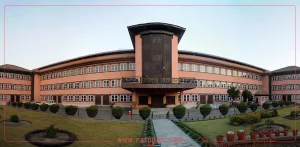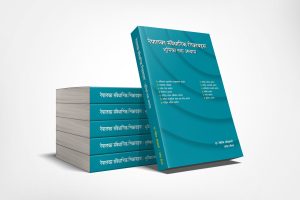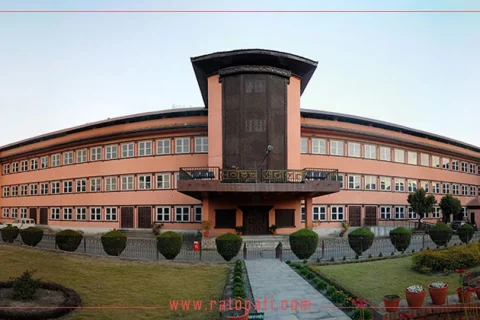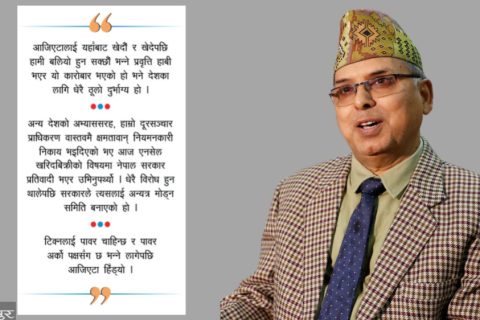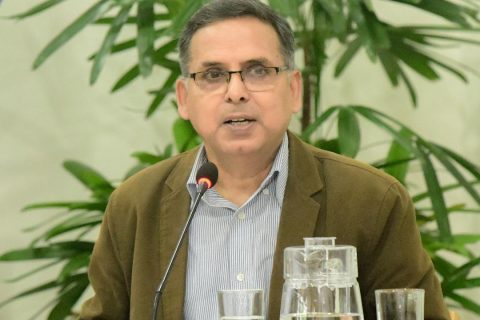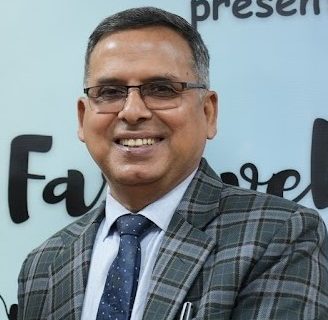Amid Deuba’s plan to move MCC grant for its ratification from the House, the Speaker has expedited his own consultations which experts call unwarranted.
Ever since his election as Speaker in January 2020, there has not been much for Agni Sapkota to do. The infighting in the then Nepal Communist Party (NCP) had already started. His “appointment” itself saw weeks-long wrangling between the two chairs of the then NCP—KP Sharma Oli and Pushpa Kamal Dahal.
Oli finally agreeing on Sapkota as Speaker was seen as a victory for Dahal.
Sapkota, a long-time ally of Dahal, by now has seen two dissolutions of the House he presides over, the breakdown of the NCP and continued obstructions of the parliamentary proceedings by the main opposition CPN-UML.
Now, he is suddenly a busy man.
As Prime Minister Sher Bahadur Deuba, who is leading a five-party coalition government, has expedited negotiations to get the Millennium Challenge Corporation Nepal Compact, a $500 million American grant, through the Parliament, Sapkota is busy soliciting views on what should be his position if the government moves the agreement in the House for its ratification.
The Communist Party of Nepal (Maoist Centre) and the CPN (Unified Socialist), two key coalition partners in the Deuba government, are against a parliamentary ratification of the compact in “its existing form.”
Deuba, however, appears to be under pressure to pass the American grant.
“The prime minister has been holding discussions to have an agreement to present the MCC compact in the upcoming House meeting. Today’s (Wednesday) meeting was positive,” Min Bishwakarma, a Nepali Congress Central Working Committee member, told the Post. “The government is clear that it cannot be kept pending any longer. It has to be presented on February 9 or in the very next meeting.”
The Communist Party of Nepal (Maoist Centre) and the CPN (Unified Socialist), two key coalition partners in the Deuba government, are against a parliamentary ratification of the compact in “its existing form.”
Deuba on Wednesday held talks twice with Maoist chair Dahal and CPN (Unified Socialist) chair Madhav Nepal to discuss ratification of the US compact.
Congress leaders say they have learnt that the Speaker is in consultations to make a position on the compact as the government is determined to present it without any delay.
“As far as I know, Sapkota and some Maoist leaders are under pressure from some forces to stand against the MCC compact,” a Congress leader told the Post on the condition of anonymity. “Their opinion will change if Dahal agrees for its ratification.”
Sapkota has been critical of the US compact, largely because the party he belonged to before his election as Speaker has been against the US grant.
According to a senior Congress leader, Sapkota holds a similar viewpoint as that of Dev Gurung and Krishna Bahadur Mahara, who are fierce critics of the US compact.
During his tenure as Speaker, Mahara too had made efforts not to let the then government move the MCC compact forward in Parliament. Mahara resigned in October 2019 following attempt to rape allegations.
In recent months, the US grant has become a lightning rod for criticism, with many questioning the American intent for providing it to Nepal and the need for the parliamentary ratification of the programme.
Oli as a prime minister then had blamed Mahara on more than one occasion for non-cooperation in tabling some bills including the MCC compact in Parliament.
Similarly, in an all-party meeting in April last year, Oli said that Sapkota was not willing to forward the government bills.
In an interview with Kantipur, the Post’s sister paper, in October 2019, Oli had said ignoring the government’s request, Mahara hadn’t allowed the MCC compact in the House for discussion. Now Sapkota seems to be doing what Mahara did, and there are suspicions if he is acting at the behest of his master—Dahal.
Constitutional experts say both Mahara and Sapkota appear to have failed to function in a non-partisan manner, which is required of someone who holds the position of the House Speaker.
“Speaker is a presiding officer. S/he must facilitate the presentation of the bills, moderate debates, make rulings on procedures and announce the results of the vote,” Bipin Adhikari, a professor and a former dean at Kathmandu School of Law, told the Post. “The Speaker is not supposed to prevent any government bills from being presented. Both Mahara and Sapkota breached that line.”
According to Adhikari, it is against the jurisdiction of the Speaker to create an opinion against the government bills which Sapkota is doing at present on the MCC grant.
The main opposition UML has not hidden its gripe against Sapkota. The only reason the UML has been obstructing the House is Sapkota refused to even take cognizance of its decision in August last year to expel some of its lawmakers. The “expelled” lawmakers, including Madhav Nepal, later split from the UML to form the CPN (Unified Socialist).
Sapkota’s increased consultations come amid Deuba’s strong position on the US compact recently. He appears firm on its ratification, with some saying he is even ready to risk the current alliance which installed him to power in July last year.
The UML has been disrupting all the House meetings dissatisfied with Sapkota refusing to even take cognizance of its decision in August last year to expel some of its lawmakers.
In both meetings with Dahal and Nepal on Wednesday, the prime minister, according to a Congress leader, said that Nepal’s credibility will be at stake in the event of its failure to ratify the US grant and that it could lead to serious ramifications for the country.
A Nepali Congress office bearer said Dahal apprised the meeting of reservations from his party members about the passage of the compact in its current form.
“We are holding parliamentary elections soon. We can defer the date of its ratification until the next elections,” said Dahal, according to the Congress member. “It can be ratified by the next parliament that comes after the elections. For that, let’s hold parliamentary polls first.”
But, in an interview with the Post last month, MCC acting Vice President Mahmoud Bah, said that they cannot hold the grant indefinitely.
In response to the question “if MCC is willing to wait until next elections,” Bah said: “… continued delays in ratification have put MCC in a position where we can no longer wait. The time has come for the government to take action and decide if it would like to continue its partnership with MCC.”
Diplomatic and political sources told the Post that the US side has given the February-end deadline to Nepal to take or reject the MCC grant.
If Nepal rejects it, a senior US official from the State Department may ring up Prime Minister Deuba to communicate their decision on withdrawal of the MCC grant, according to multiple people in the know of recent developments.
The next MCC Board meeting is scheduled in mid-March.
Sources said US officials have told the Nepali leadership that they are increasingly under pressure from several other countries for the US grant.
Another Congress leader said Deuba is well aware of how Washington deciding to annul the grant could tarnish Nepal’s image in the international arena.
Therefore, according to the leader, Deuba told Dahal at Wednesday’s meeting that he would be forced to seek the UML’s support if coalition partners continue to waver on the US grant.
“Dahal then urged Deuba to wait until the three-member task force formed by the government to study the MCC compact presents its report,” the leader told the Post.
Senior CPN (Unified Socialist) leader Jhalanath Khanal is leading the MCC task force, with Maoist leader Narayan Kaji Shrestha and Minister for Communication and Information Technology Gyanendra Karki as members. The task force, however, has barely held any meetings to discuss the matter. Both Khanal and Shreshtha are known as critics of the MCC compact.
Though Khanal claimed that they are studying the various provisions of the MCC agreement, Karki said the task force has already submitted its recommendation to the government.
Deuba on Wednesday asked Dahal and Nepal to provide him the compact’s provisions on which they have reservations.
“We are going to submit the points that need to be amended,” said CPN (Unified Socialist) chair Nepal while speaking at a function at party headquarters.
“We have discussed several points of the MCC agreement and we clearly told the prime minister that we cannot ratify the MCC in its present form.”
According to Nepal, there is no chance of the present alliance breaking down over the MCC issue.
Meanwhile, the UML, which has refused to make its position clear on the MCC compact ever since it became an opposition party, is learnt to have communicated to the government to first table the agreement in Parliament and let lawmakers decide on their own whether to vote in favour or against.
After coming under pressure, some leaders say, Dahal appears to be using Speaker Sapkota to stop the agreement from moving ahead for voting.
Those close to Sapkota, however, say he doesn’t have any position on the MCC compact. They claim that his recent meetings are just aimed at making the House functional.
Shreedhar Neupane, Sapkota’s press advisor, told the Post that the Speaker’s only wish is to have a broader consensus on the MCC compact as it has become one of the most debated issues.
“The Speaker also wishes for an intense discussion on it to clear the confusion, if there is any, for which the House needs to be in order,” said Neupane. “Parliament proceedings have been affected due to obstructions by the UML.”
According to Neupane, the meetings by the Speaker shouldn’t be taken otherwise.
“Full-fledged discussions have not been possible because of UML’s obstructions and the MCC is not an issue that can be pushed amid sloganeering,” he said.
Former Speakers, however, say actions of the Speaker must speak that they have performed a neutral role.
“Claiming oneself that s/he has played a neutral role is not enough. Their actions must speak for themselves,” Taranath Ranabhat, a former Speaker, told the Post. “The Speaker’s role is to facilitate the presentation of the bills in coordination with the government.”



